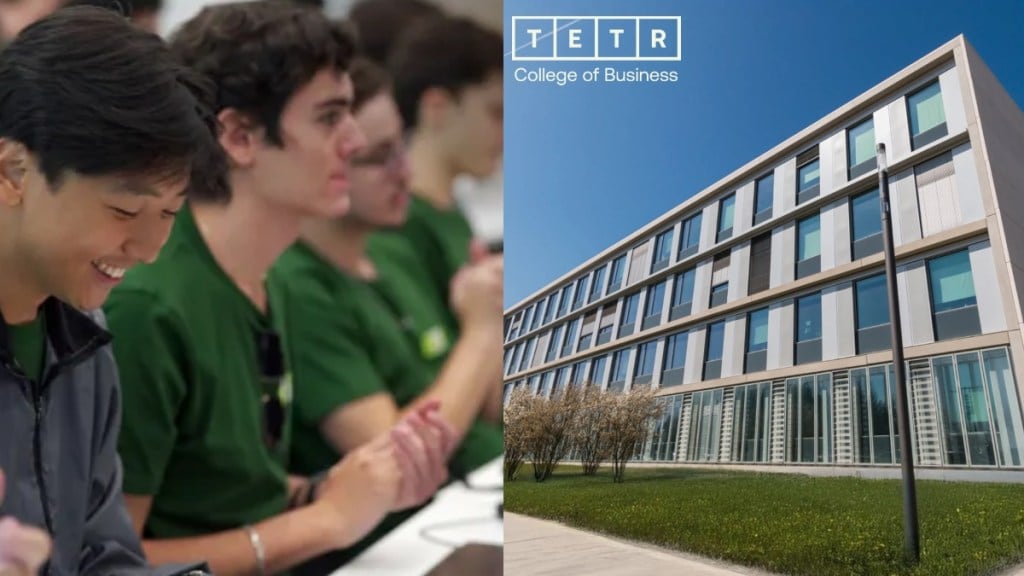Tetr College of Business, founded in 2024 by serial entrepreneur Pratham Mittal and based in New York, positions itself as a disruptor in higher education with its distinctive four-year programs – a Bachelor’s in Management and Technology (BMT) and a Bachelor of Science in Artificial Intelligence (BSc AI).
These courses blend rigorous academics with global entrepreneurial immersion. With faculty drawn from institutions and organisations such as NASA, Harvard, Stanford, Estee Lauder and American Express. At Tetr, students go beyond classroom learning to actually create and scale businesses in seven countries, including India, Dubai, Singapore, Malaysia, Ghana, the United States and Argentina – offering them first-hand exposure to diverse global markets.
“We think of it as a sandbox,” says Tarun Gangwar, Director and COO of Tetr. “If you screw up in college while building a business, the worst that happens is a grade. But if you fail as a CXO in the real world, you risk hundreds of jobs. At Tetr, the downside is protected, but the upside is huge.”
Books meet the real world
Gangwar is blunt about what Tetr aims to fix in higher education. “When I was in IIT Bombay, I realised much of what we studied was from books written a century ago. The gap between theory and practice was massive,” he recalls. “In business, decisions impact livelihoods. If you take them based on outdated theories, the harm is real. That’s why we built Tetr’s model – learning in the classroom, applying it outside the classroom, every single day.”
Tetr claims that its format is intense. Mornings are spent in workshops on subjects like running ads, reading balance sheets, or building apps. Afternoons are “business hours,” where students sit in cubicles with their teams, working on live ventures under the supervision of industry mentors.
Stories of grit and growth
The results have been surprising – even for the faculty. Gangwar remembers a bet he lost. “We thought no student would cross $100,000 in revenue within a semester. A student from Singapore proved us wrong by selling luxury bikes worth $8,000–$10,000 each and crossed six figures in weeks. I ended up granting him $25,000.”
Another venture, 8 Billion Project, brought together students from India, Pakistan, Myanmar, Ukraine and Israel to launch a peace-promoting apparel brand. “It was powerful to see young people from conflict zones building something around unity,” Gangwar said.
Then there’s Serve Club, a pickleball startup born out of India. “In just five months, they raised nearly Rs 50 lakh in funding and built one of India’s largest CXO pickleball communities. It shows what’s possible when you mix global exposure with entrepreneurial drive.”
Why do seven countries matter?
Tetr’s model is designed around immersion. Students launch different ventures in each country – e-commerce in Dubai, consumer brands in India, fundraising campaigns in Singapore and social enterprises in Ghana.
“Every market teaches you something new,” explains Gangwar. “Indian consumers are price-sensitive. Singaporeans, with one of the highest per capita incomes globally, value quality. In Ghana, the challenge is building for impact. By the time our students finish, they can be airdropped anywhere in the world and know how to build for that market.”
Partnerships that open doors
To anchor academics, Tetr has tied up with IITs in India, National University of Singapore and Cornell in the US. “If you’re in Singapore and don’t experience NUS, you’re missing out,” Gangwar said. “Our idea was simple – give students the best of academia and the best of industry.”
Tetr currently hosts around 200 students, nearly a third from India. But the school is already expanding. Alongside its undergraduate programs, it has added a Master’s degree and is eyeing executive education.
Gangwar believes Tetr represents a global shift. “Five or ten years ago, students went to the US chasing the American dream. Now, they want global education but don’t want to tie their future to one country. That’s exactly what Tetr offers – not just a degree, but the confidence to build anywhere.”
Admission process and eligibility
Admission to Tetr’s Bachelor’s program is highly competitive and open to students who have completed Class 12th or an equivalent qualification. Applicants should be between 18 and 20 years of age at the time of joining and are expected to showcase qualities such as initiative, creativity, problem-solving skills, and leadership potential.
While standardised test scores are not a requirement, the average SAT score of admitted students is around 1475. The selection process involves three stages: first, submitting an application form with personal details, academic records, and extracurricular achievements; second, appearing for the Tetr Trial, a 90-minute AI-powered aptitude test; and finally, attending a one-on-one interview with an industry leader.


